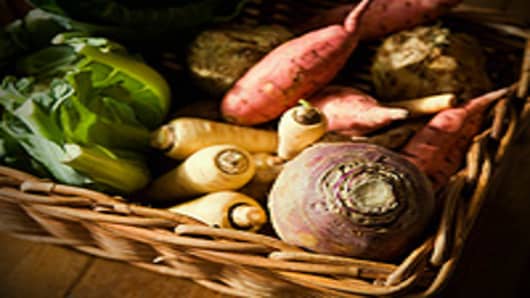The latest big trade to profit from is agriculture. But with international food prices hitting record highs, campaigners are furious and it is adding to a regulatory zeal.
"Food isn’t an asset, it’s a basic human need," says the World Development Movement’s Heidi Chow. "The (futures) market was set up for farmers and food producers to hedge risks inherent in what they do. Betting on the price of food is having a catastrophic effect on the lives of millions of people in developing countries – or even those on low incomes in the U.S. and UK."
But are speculators really driving prices to artificial levels?
It’s clear the amount of money invested in long-only indices for agriculture – along with energy and metals - has rocketed. But that’s not necessarily the same thing as physical demand for these commodities.
"For every long there is a short; for everyone who thinks the price is going up there is someone who thinks it is going down; and for everyone who trades with the flow of the market, there is someone trading against it," wrote Professor Tom Hieronymus.
50 years on, the current Professor of Agriculture Marketing at Illinois takes up the ‘zero-sum’ market argument.
"A very large number of futures and derivative contracts can be created at a given price level. In theory, there is no limit," writes Professor Scott Irwin. "This is another way of saying that flows of money, no matter how large, do not necessarily affect the futures price of a commodity at a given point in time.
"In order to impact the price in the cash market, index investors would have to take delivery and/or buy quantities in the cash market and hold these inventories off the market," he tells Econbrowser.
But America’s most powerful regulators are more pragmatic. Bart Chilton is one of five voting members on the US Commodity Futures Trading Commission. He takes the 2008 spike in prices as his starting point: "$200 billion of speculative money came into the market; institutional holdings, hedge funds, pension funds. We got extraordinary high prices. But there are now more speculative positions than in 2008 – we now have the highest speculative positions in history."
"Some people are arguing that we are seeing ‘delinked’ prices – prices ‘delinked’ from true demand and supply – sugar, cotton, cocoa & coffee. I’m not an economist. I can’t say what percentage is due to speculation. But it’s easy to find evidence that they are having an impact.," concludes Chilton.
At the World Development Movement, Heidi Chow is campaigning for tighter regulation of any speculation in staple foods.
"We want all food derivative trades to go over public and transparent exchanges, and not Over The Counter (OTC) where bankers strike private deals with no disclosure and in secret. We want position limits set so that hedge funds and investment banks can’t speculate excessively," Chow says.
Some of Chow’s hopes may soon be realized in the United States. Commissioner Chilton expects to push again next Thursday for his agency to vote to limit speculative positions to 10 percent.
That’s 10 percent, regardless of whether it’s held on regulated markets or the vast pool of OTC contracts. And it's not just swaps and futures for agriculture, but energy and metals as well.
The CTFC had to design new rules anyway under the Dodd-Frank financial overhaul. "Before the new law we had some authority, now we are mandated to do it. Limits will be in place. It’s just a question of when," says Chilton.
Two Republicans on the CFTC have vetoed action for fear it could damage the market. Chilton says, however, that a 10 percent limit will only really effect the biggest of the large banks. But the scale of positions that might have to be liquidated are enormous.
"In September in silver we had on trader with 35 percent of the regulated market. In natural gas or crude oil one trader can hold greater than 20 percent," says Chilton. ‘We regularly see a much higher percentage than will be permitted in wheat, corn, sugar.
"As regulator, our job is not to come in as the Fire Service, picking over charred remains," he adds. "Our jobs is to act like Police – to prevent and deter fraud and manipulation."
Catch Prof Scott Irwin & The World Development Movement debating this subject on Street Signs with Erin Burnett Friday at 2:40pm on CNBC.


